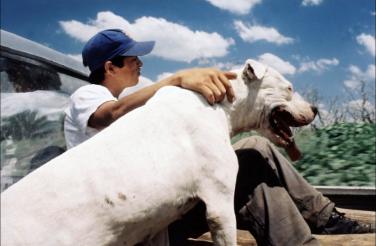
La libertad, Lisandro Alonso, Argentina, 2001, 73’
Let's start with the legend: they say that a young Lisandro Alonso, after graduating from the Universidad del Cine, returned to his family home in the countryside and for months filmed something that no one knew, not even himself, could become a film. That material was edited and sent to the Buenos Aires independent film festival. At the same time, and while the first Argentine critics wondered where that film had come from, which was blowing away the old film tradition and was related to the auteur trends in the rest of the world, one of the selectors of the Cannes Film Festival had access to a VHS copy of the film. His reaction was immediate: astounded by what he had just seen, he immediately included it in the Un Certain Regard section of the competition after a call to Alonso in which he had to explain several times that he was calling on behalf of Cannes. "Cannes, yes, a film festival there is in France", he reportedly had to say by telephone. However, at the festival they asked Lisandro Alonso to change the ending of the film.
And this is how the career of Lisandro Alonso started: from the anonymous immensity of the Pampa, to the world's most important film festival.
Misael lives in the immensity of the Pampa mountains, working with his axe, cutting down trees, in complete solitude. He survives with just the essentials and with barely any contact with other people. We see his life as a worker, his gestures, his rituals. But we're not talking about an observational documentary, this is something else. This film is something else, something that takes flight and rises beyond a portrayal and a landscape. Its impact was huge, this film was followed by hundreds of others which tried to do the same.
We finished, once again, with the legend: no one knew whether the story about the eliminated ending had been invented or was part of an extraordinary story until the special DVD edition published in Argentina contained extras that included the suppressed sequence: Misael looking at the camera, smiling first, and then laughing out loud. The ending that France did not want and which Lisandro decided to cut out.
This was the birth of a unique film which through the title itself was for the first time, and forever, the vital and cinematographic declaration of its young director.
They say that a young Lisandro Alonso, after graduating from the Universidad del Cine, returned to his family home in the countryside and for months filmed something that no one knew, not even himself, could become a film.
